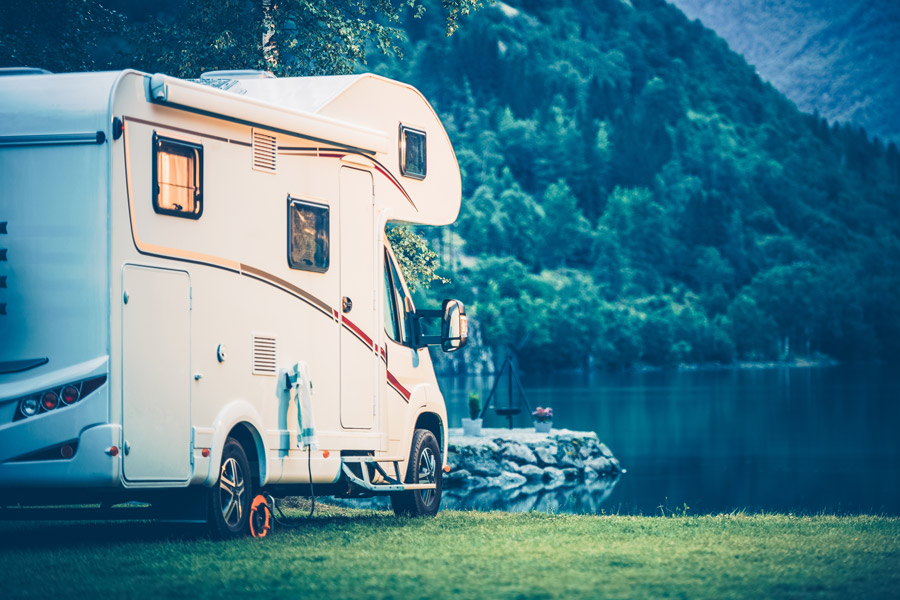As in the previous year, camping holidays are proving extremely popular in 2021. Out of necessity, you might say. Due to the coronavirus pandemic, many holidaymakers are preferring to go on holiday in mobile homes, campers etc. in their own country or in neighbouring countries. Many holidaymakers are trying out a camping holiday for the first time. Camping novices in particular would benefit from a few tips to make for a more relaxed holiday.
I'm speaking from my own experience. A mobile home like this is a complex vehicle with a wealth of technical devices. And there are one or two things to be taken into account at the campsite.
Selecting the vehicle
Most novice campers rent a mobile home, camper or a caravan. For the first camping holiday, it's important that the holidaymakers feel comfortable with the vehicle: Not everyone feels comfortable, pulling a caravan with their own car, for example. Even a larger mobile home isn't necessarily everyone's cup of tea. And it's not even an option for everyone: This depends entirely on the weight and driving licence.
A flexible camper which is comparatively easy to drive is generally the ideal choice for embarking on a new camping career. In this case, however, holidaymakers usually have to do without a shower or toilet. Travelling by caravan also offers greater flexibility at the destination because the equipment set up around campers or mobile homes needs to be repacked before taking a day trip.
Destination and route
To save a lot of stress, plan most of the route and your destinations in advance. Camping novices should not choose excessively demanding routes at the start. The daily drive should not be longer than three to four hours.
Anyone going on a camping holiday in Germany can rely on an outstanding infrastructure and will not have to adapt to new international traffic regulations. A real advantage. Special travelling guides help to find the perfect camping space with the expected level of comfort.
In the beginning, holidaymakers should choose real campsites over pure pitches. These normally have good sanitary facilities, power connection for your own vehicle and shopping facilities. By the way, wild camping is prohibited in Germany and is subject to strict regulations in most other countries.
Familiarise yourself with the vehicle and its systems before driving
This is an important point! Before going on the big journey, you should familiarise yourself with the vehicle and its systems. "Systems"? Yes, that's right. Mobile homes and campers in particular are real all-rounders: The cooker, the refrigerator and the heating system usually run on gas. It's not sorcery. Stress on site can be avoided by getting to know the equipment before starting a journey.
If a toilet is on board, it's also important to ensure you know how it works. You should try it out before setting off on holiday: What are the important points to remember when operating the toilet, how do you dispose of the toilet waste and service water?
The topic of electricity
Most campsites in Germany offer a 230 volt electricity connection for campers. The power connection can be used to watch TV or run the refrigerator. Campsites in the Netherlands, Belgium and northern France are also usually equipped with CEE sockets. In other countries, campers may need a special adaptor.
The blue "CEE plugs" with three-pin connection are standard. Mobile homes and caravans with CEE connections have been the norm for many years. CEE connections comply with protection rating IP 44 and are therefore protected against splash water ingress. The important thing is that camping cables may only be 25 metres long. The longer and the thinner the cable, the higher its electrical resistance. "At maximum current consumption (16 A), an old 50-metre cable with 1.5 mm² would use a hefty 300 watt," states Caravaning.de. "With a 25-metres cable with 2.5 mm², on the other hand, the consumption is less than 100 watt."
Incidentally: At Herth+Buss, the Elparts range includes a very comprehensive range of CEE plugs and sockets for 230 V (3-pin) and 400 V (5-pin). And not just for camping. After all, CEE connectors are not only suitable for camping applications, but also for universal use in commercial vehicles, for example in refrigerated case bodies, beverage trailers, swap bodies, heavy-load flat-beds and fire brigade vehicles.

